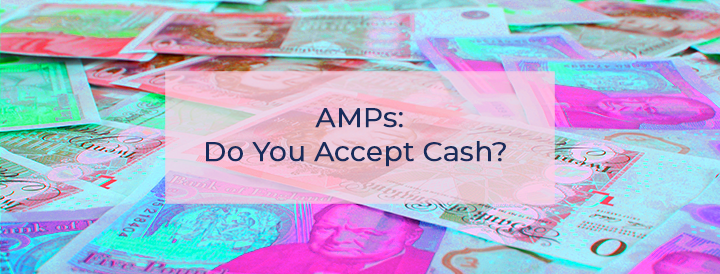
AMPs: Do You Accept Cash?
…If so, should you register with HMRC as a High Value Dealer (HVD)?
Not all cash payments create a duty to register with HMRC for supervision for anti-money laundering. However, any businesses or sole traders that make or receive cash payments of 10,000 euros (or equivalent in another currency) or more in exchange for goods are required to register for supervision by HMRC.
There are 18 sectors into which HMRC classifies HVDs, and the ones it identifies as at greatest risk of criminal abuse include: jewellery and precious metals, cars and vehicles, and cash and carry / alcohol. Other examples of the types of goods for which cash is exchanged include; wine, watches, works of art and tobacco. The regulatory focus is less on the type of good sold than the amount of cash given or accepted.
Making or receiving a cash payment includes when a customer deposits cash directly into the HVD’s bank account, or when cash is paid to a third party for the benefit of the HVD. HMRC explains that an HVD meets or exceeds the € 10,000 threshold when there:
- Is a single cash payment of 10,000 euros or more for goods,
- Are several cash payments for a single transaction totalling 10,000 euros or more, including a series of payments and payments on account
- Are cash payments totalling 10,000 euros or more which appear to have been broken down into smaller amounts so that they come below the relevant cash payment limit
Internationally, law enforcement agencies are increasingly viewing cash payments as inherently suspect.
In fact, the latest UK National Risk Assessment Report from 2020 acknowledges the possibility that a higher proportion of HMRC’s register of supervised HVDs is likely to consist of those with criminal inclinations.
In 2020, the UK Government raised HVDs’ Money Laundering risk rating from Low to Medium, while keeping the HVD risk rating as Low for terrorist financing.[1]
Consistent with many businesses, there is a reluctance to accept or pay cash, and the number of registered HVDs is decreasing. Many businesses, and many of our FCS Compliance clients, have self-imposed a policy that they will no longer accept any cash. Others are simply setting a cash acceptance limit that is below the €10,000 threshold.
If you do accept cash or make cash payments, the requirements for HVDs are similar to HMRC’s other regulated sectors. in this case, you must not only register with HMRC and pay a registration fee, but you must amend any registration information as and when it changes. You also need to renew the registration when it expires.
When you receive a cash payment, you must ensure not only that you are registered, but if a business or sole trader is paying you the cash, you must check to see if they are registered. If the party paying you the cash should be registered but is not, HMRC advises that not to do business with them and to report them.
Lack of proper registration by HVDs is the most common reason for the penalties most recently imposed by HMRC.
Consider for example the most recent list of parties receiving a penalty between 1 April 2023 and 30 September 2023. This list includes some half dozen HVDs who received penalties ranging from £2500 to £49,000, and virtually all of the penalties were for failing to register as an HVD.
Other potential civil penalties include suspending or cancelling the HVD registration; banning or suspending individuals from participating in a supervised business; and issuing a public statement that censures the business. Beyond these civil and reputation risks, there is a risk of criminal prosecution. If convicted, the HVD risks a fine and imprisonment of up to two years.
Accepting or paying cash carries responsibilities and risks with it, in fact registering with HMRC is only one of the many regulatory requirements to be met.
If you would like further information and help on the topic of HVDs, please contact us here.
[1] The UK National Risk Assessment Report of 2020, is found here https://www.gov.uk/government/publications/national-risk-assessment-of-money-laundering-and-terrorist-financing-2020
Article written July 2024
